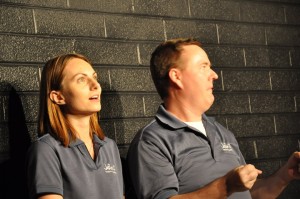A look into improv through the eyes of Camille Hartmetz

Camille Hartmetz
People of all ages and temperaments in the Jester’Z audience, when questioned about their interest with performing Improv, reveal a statement akin to: “I love Improv, but I could NEVER do that.” My unequivocal response is simply “It’s our training…it doesn’t come naturally to most of us…and you could absolutely do this!”
Public speaking is most peoples’ number one fear – even surpassing fear of death. How much potential artistic talent out there in our audience and in the world is suppressed by fear? I wonder this when I reflect on my own unforeshadowed Improv oddessy.
To illustrate: As an only child, I was a silent book worm and was sometimes grounded from reading by my mother in the hopes that I would socialize with others. I was utterly unable to speak to few people beside my parents, some kind-hearted teachers, and some best girl friends. My crush in high school actually told a friend of mine that he would like me if I would just speak to him…at all. I remember his brown leather Doc Maarten buckled leather sandals very clearly because that’s the part of him on which I most often gazed. I thought everything I had to say was asinine and stupid.
How, then, did I get to be a main stage player at Jester’Z?
After a particularly tempestuous 25th year of life, of getting dumped and talking to my cats one too many a night, I decided to march right up to my fear and slap it in the face. I enrolled in Jester’Z’s Beginning Improv class after seeing a show and just laughing ‘til I cried. I never assumed I could perform with the Jester’Z, I just wanted to create.
After the first Improv class at Theater 168, the pull of creating began to manifest, and the grip of fear slowly uncoiled, although not right away. When I entered the Theater as a student for the first time and met Jef Rawls, our director and teacher, I was literally shaking, although I think I hid it well. I glanced toward the door often to make sure my escape hatch was still available to me. My heart raced when just introducing myself, simply speaking my name, to my classmates; performing on stage never entered my mind.
Even in class I wasn’t comfortable going on stage unless Jef could show me how to do it perfectly and tell me what was the “right” thing to do in every scene. What I didn’t know is that the very basis for Improv is self-esteem and that in order to learn to improvise, I had to learn the first lesson of Improv: everything you think, do and say is valid.
Think about this. No matter what your age, level of education, state of mind, or level of stage experience, everything you create has merit and is worthy of exploration, simply by virtue of you being alive and having life experience from which to draw. This means that if you sit on stage and decide you are drinking a glass of water with a table beside you, every one who enters that scene needs to honor that creation and walk around your table, not through it. Likewise, if the audience gives a suggestion of “Vegetarian” and you initiate the scene as Sarah Palin, or Ted Nugent, that choice is also completely valid and must be honored. You have to trust yourself enough to make and hold firm to your choice, and know through experience and training that your fellow players will support your decision, even if at first blush a connection between your initiation and the audience suggestion is not evident. The most magical scenes are those that do not start out immediately associated with the suggestion, but take the long road to discovering the connection (and there is almost always a connection to be found).
Try this experiment: Imagine that you are on stage (gasp) and that you are about to perform a scene (double gasp) in which the suggestion is Quantum Particle Theory, which you know aboslutely nothing about, except for that you hated physics in school. The best thing to do in this scenario is to make a strong, clear choice about who you are and what you are doing, and trust that first, your choice is valid, and second, that your fellow players will support it.
My first instinct when starting Improv classes was that my take on a suggestion had to be funny, witty, or “correct” for the scene. What I didn’t realize is that Improv flows naturally from an acceptance and application of the principle “everything I think and say is valid” and that by second-guessing my thoughts and the choices of others I was actually suffocating the scene with doubt.
I still feel scared from time to time, often when I don’t know which choice to make, or imagine I might not be supported. Remembering my training, and making eye contact and joking with my fellow Jester’Z helps me realize that we are deeply connected in a web of trust and affirmation, and that no man (or woman) goes up on that stage alone.
